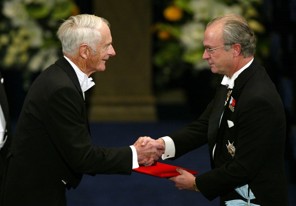
William Standish Knowles, a Nobel Prize winning chemist, died at the age of 95 on June 13, 2012. According to his daughter Lesley McIntire, Dr. Knowles had complications from Lou Gehrig’s disease, which ultimately led to his death. He was one of the recipients of the 2001 Nobel Prize in Chemistry, along with Ryoji Noyori of Nagoya University and Karl Barry Sharpless of the Scripps Research Institute.
Dr. Knowles led a research team that developed a chemical catalyst that could create a safe reaction to produce L-Dopa, a drug for treating Parkinson’s disease. Before Dr. Knowles’s discovery, the production of the drug was complicated and expensive because L-Dopa was almost the same as a similar, yet toxic D-Dopa molecule. Using the differences in the shape, form, and symmetry of two molecules with the same composition, which can determine biological and medicinal properties, Dr. Knowles’s team devised a catalyst that only produces L-Dopa, instead of D-Dopa. Dr. Knowles’s research is still used to make antibiotics, anti-inflammatory drugs and heart medicines.
Dr. Knowles was born in Taunton, Mass. on June 1, 1917. After graduating from Berkshire School, Dr. Knowles went to Harvard University to earn his Bachelor of Science degree in chemistry, with focus on organic chemistry, and then attended Columbia University for Ph.D. degree. He began working for The Monsanto Company, a multinational agricultural biotechnology corporation, in St. Louis, Miss. where he ended up spending most of his career.
When the Royal Swedish Academy of Sciences in Stockholm rewarded Dr. Knowles the Nobel Prize in chemistry, he was 84 years old. Regarding the honor of receiving the Nobel Prize, Dr. Knowles said, “I didn’t really expect it would happen to me, but that probably made it doubly sweet.”


Hi Jisoo, this was a nice informative piece that could have been an obituary. In your lead, you should try to highlight the significance of Knowles and our intended audience, the Korean community. In other words, why is this death significant to the readers? Also, if you had gotten more quotes from students or teachers who knew his works, it would have added to the significance of his death. Overall, good article!